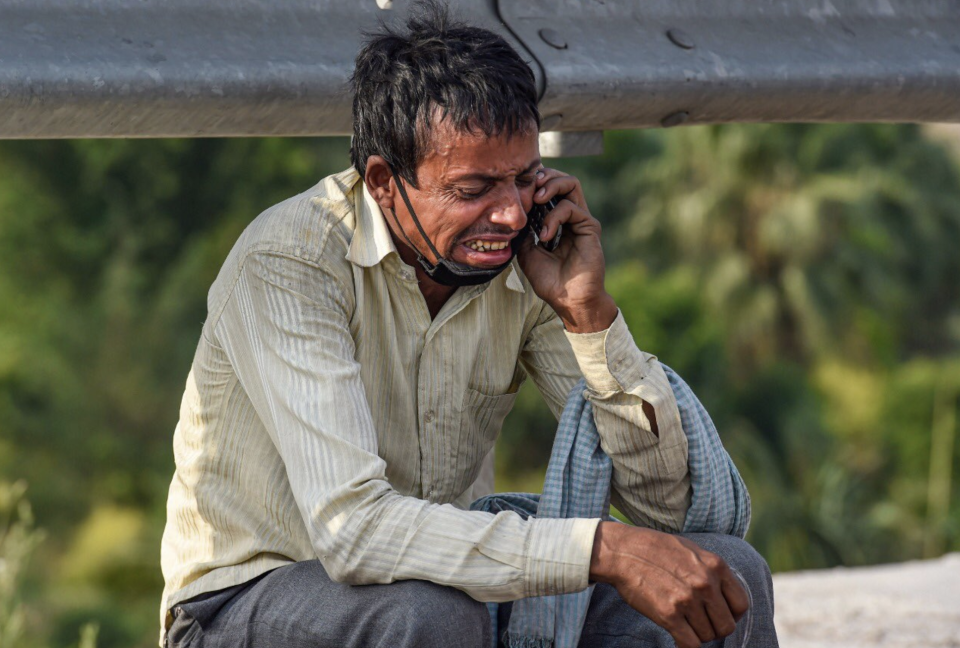Heartbreaking story behind powerful photo from coronavirus-hit nation
The tragic story behind a photo of a penniless migrant crying on the phone has emerged after the photographer revealed what his conversation was about.
Press Trust of India (PTI) photographer Atul Yadav snapped the powerful photo of Rampukar Pandit sobbing uncontrollably while sitting by the Nizamuddin Bridge in Delhi amid the coronavirus pandemic.
According to PTI, he had been there for three days as he was struggling to afford a train ticket home to Begusarai, almost 1200km away, after he discovered his infant son had died. It is not known how his child died.
"In the last few weeks, I have come across and photographed so many migrants, one more helpless than the other, and honestly I didn’t expect to feel surprised at the sight of a grown man crying. But I was," Yadav wrote for PTI.

Rampukar was eventually helped by a woman who booked him a ticket home and gave him $110.
As he returned home he had to go into quarantine and the 38-year-old could only see his wife and nine-year-old daughter from a distance as he was being tested for the coronavirus when he returned from Delhi.
He told PTI he could not hug his family due to social distancing rules.
“We were all crying, we wanted to hug each other. I wanted to hold my daughter, but a few metres of closeness and 10 minutes with them is all I could get,” he told PTI.
According to Johns Hopkins University data, more than 3400 people have died of the coronavirus in India while more than 110,000 are infected.
Migrant workers struggle to return home
Migrant workers are being hit particularly hard as they lose their jobs and suffer from accidents and starvation as they struggle to make their way home.
On May 16, a photo emerged of a man reportedly walking 1200km while carrying two children in baskets.
Other images showed hordes of migrant workers lining up at railway stations in a desperate bid to make their way home.
Many have been left without a job and income since the country initiated a coronavirus lockdown on March 24.
A migrant labourer taking his two girl children like this from Kurnool to Chattisgarh i.e. a distance of 1200 km. Numb. pic.twitter.com/QgPuhxhgNq
— Yatharth Mishra / यथार्थ मिश्र (@YatharthMishra_) May 16, 2020
India will run more special trains and buses to allow millions of distressed migrant workers to leave big cities, as concerns grow in some states over rising infections from those returning home.
Workers are walking long distances to their homes in the countryside ever since Prime Minister Narendra Modi imposed a vast lockdown to control the spread of coronavirus, shutting down all public transport.
After initially trying to keep them in their cities of employment, authorities are now helping them get home.
The federal home ministry said it was working with states to run special trains and buses, and set up rest stops for those on foot.
The move came as India's confirmed cases surged past 100,000 on Tuesday, outstripping China, where the virus emerged late last year.
The concern is that migrants, who are leaving coronavirus hotspots such as Mumbai, New Delhi and Ahmedabad, could be carrying the virus into the hinterland.

Since early May, around 70 per cent of all coronavirus cases in the densely populated eastern state of Bihar have been linked to migrant workers, the state's top health official, Sanjay Kumar, said.
"The top priority is the people who are coming from Delhi because they have the highest percentage of positive cases," Kumar told Reuters.
In Odisha, also in the east, 851 out of 978 confirmed cases up until Tuesday were returnees, mostly migrant workers, according to state data.
'Mass killings': Trump unleashes on China as global virus numbers take unsettling turn
Nurse's confronting body transformation after coronavirus battle
'We’re humans too’: Coronavirus ICU nurse breaks down in tears
In the state's Ganjam district, more than 53,000 migrants have been screened and quarantined since early March, and another 200,000 are expected later this month, a health official said.
The official said managing such numbers was a challenge.
"Things are under control but we could have handled it much better had people been brought in smaller numbers in phases," he said.
with Reuters
Do you have a story tip? Email: newsroomau@yahoonews.com.
You can also follow us on Facebook, Instagram and Twitter and download the Yahoo News app from the App Store or Google Play.




